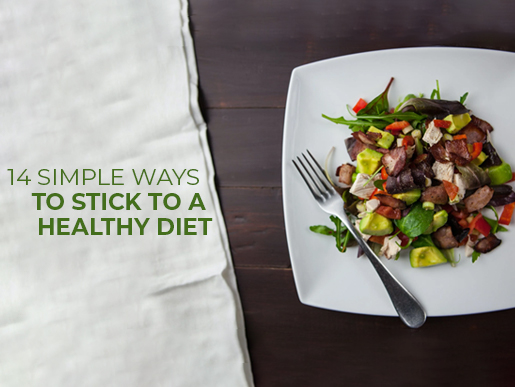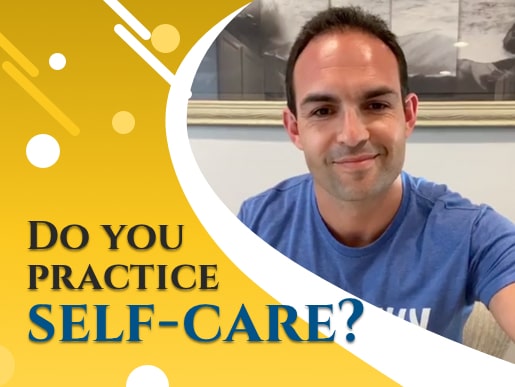Eating healthy can help you lose weight and have more energy.
It can also improve your mood and reduce your risk of disease.
Yet, despite these benefits, maintaining a healthy diet and lifestyle can be challenging.
Here are 14 ways to stick to a healthy diet.
1.Start with realistic expectations
Eating a nutritious diet has many benefits, including potential weight loss. However, it’s important to set realistic expectations. For example, if you pressure yourself to lose weight too quickly, your plan to achieve better health may backfire. Researchers found that people who are overweight and expected to lose a lot of weight were more likely to drop out of a weight loss program within 6–12 month. Setting a more realistic and achievable goal can keep you from getting discouraged and may even lead to greater weight loss
2. Think about what really motivates you
Remembering why you’re making healthy choices can help you stay on course. Making a list of specific reasons why you want to get healthier can be helpful. Keep this list handy and refer to it when you feel you need a reminder.
3. Keep unhealthy foods out of the house
It’s difficult to eat healthy if you’re surrounded by junk foods. If other family members want to have these foods around, try keeping them hidden rather than on countertops. The saying out of sight, out of mind definitely applies here. Having food on display in various areas of the house has been linked to obesity and increased consumption of unhealthy foods.
4. Don’t have an ‘all or nothing’ approach
A major roadblock to achieving a healthy diet and lifestyle is black-and-white thinking.
One common scenario is that you have a few unhealthy appetizers at a party, decide that your diet is ruined for the day, and proceed to overindulge in unhealthy foods. Instead of considering the day ruined, try putting the past behind you and choosing healthy, unprocessed foods that contain protein for the remainder of the party. This will help you feel full and satisfied rather than stuffed and frustrated.
A few off-plan choices make very little difference in the long run, as long as you balance them with healthy foods.
5. Carry healthy snacks
Sticking to a healthy diet can be tough when you’re away from home for extended periods.
When you get too hungry on the go, you may end up grabbing whatever is available.
This is often processed food that doesn’t really satisfy hunger and isn’t good for you in the long run.
Having healthy high-protein snacks on hand can help keep your appetite in check until you’re able to have a full meal. Some examples of good, portable snacks are almonds, peanuts, and jerky. Also consider filling a small cooler with hard-boiled eggs, cheese, or Greek yogurt.
6. Exercise and change diet at the same time
You may have heard you shouldn’t change too many things at once when trying to improve your health. In general, this is good advice. Still, research shows that when you make both dietary and physical activity changes at the same time, the results tend to reinforce each other.
7. Have a game plan before eating out
Trying to maintain a healthy diet while eating out can be very challenging. Still, there are ways to make it easier, such as checking out the menu before you go or drinking water before and during the meal.
It’s best to have a strategy in place before you get to the restaurant rather than being overwhelmed once you get there.
8. Don’t let traveling derail you
Whether you’re traveling for business or pleasure, being outside of your familiar territory can make it difficult to stick to a healthy lifestyle. Here are a few tips:
- Research the restaurants and supermarkets ahead of time.
- Pack some healthy foods that don’t spoil easily.
- Challenge yourself to stay on track for most of the trip.
9. Practice mindful eating
Eating mindfully can help you maintain a healthy lifestyle.
Take time to enjoy your food and appreciate its ability to nourish you. This increases your chances of making successful, lasting behavioral changes.
In a four-month study, overweight and obese women who practiced mindful eating significantly improved their relationship with food. Another 6-week study in women with binge eating disorder found that binge episodes decreased from 4 to 1.5 per week when the women practiced mindful eating. Plus, the severity of each binge decreased.
10. Track and monitor your progress
Logging the foods you eat into a diary, online food tracker, or app can help you stick to a healthy diet and lose weight. Measuring your exercise progress is also beneficial and provides you with the motivation that can help you keep going. In a three-month study, overweight women who were given pedometers walked farther and lost six times more weight than those who didn’t use them.
11. Get a partner to join you
Sticking with a healthy eating and exercise plan can be tough to do on your own.
Having a diet or exercise buddy may be helpful, especially if that person is your partner or spouse.
Researchers studying data from over 3,000 couples found that when one person made a positive lifestyle change, such as increasing physical activity, the other was more likely to follow their lead.
12. Start the day with a high-protein breakfast
If your first meal is well balanced and contains adequate protein, you’re more likely to maintain stable blood sugar levels and not overeat for the rest of the day.
In one study, overweight women who consumed at least 30 grams of protein at breakfast felt more satisfied and ate fewer calories at lunch than those who ate a lower-protein breakfast.
13. Realize that it takes time to change your habits
Don’t be discouraged if it takes longer than you expect to adapt to your new, healthy way of living.
Researchers have found that it takes an average of 66 days to make a new behavior a habit.
Eventually, eating healthy and exercising regularly will become automatic.
14. Figure out what works best for you
There is no perfect way that works for everyone.
It’s important to find a way of eating and exercising that you enjoy, find sustainable, and can stick to for the rest of your life. The best diet for you is the one you can stick to in the long run.
The bottom line
Breaking your habits and improving your diet is not easy.
However, several strategies can help you stick to your diet plans and lose weight.
These include mindful eating, keeping unhealthy snacks out of sight, carrying healthy snacks, and managing your expectations. Still, one of the keys to a successful diet is finding out what works for you in the long term. If you’re trying to lose weight, some of the strategies above may give you a significant advantage.






